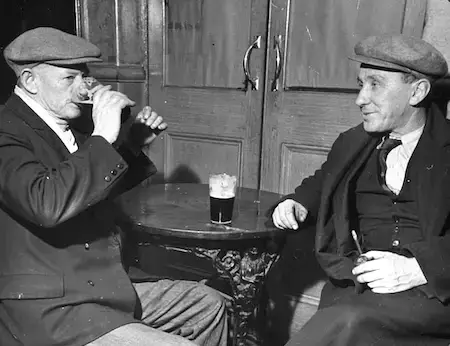The expression is found in it’s shortened form ‘to see a man’ in numerous early examples in print and it is likely that it existed in that form before it was extended. Dogs weren’t the only creatures co-opted into the deception. Other variants ‘see a man about a horse/duck/monkey’. For reasons unknown it was the dog version that caught on.
Euphemisms, by their nature, are meant to misdirect. So, if dogs, horses, monkeys or ducks weren’t going to be discussed with the mysterious ‘man’, what was?
“I’m going to see a man about a dog” can be translated as one of these:
- I’m off to the pub.
- I’m going to the toilet.
- I’m going to see someone you wouldn’t approve of me seeing, possibly a lover, possibly a ne’er do well.
The phrase is British in origin and started appearing in print in the 1860s. The first known example of it is in On Falling In and Out of Love, published in the London magazine The Anti-Teapot Review in 1865:
The wife of 35 will ask how it is that she is no longer the queen she was years ago, when there were lots of suitors ready to “win” her (as she thought) at any price. The husband will meekly excuse himself from offering an explanation; feel himself henpecked; and twice a week, at least, will find that he has to absent himself by going to London, to “see a man about a dog,” or on some other important business.
Which of the above alternative pub/toilet/mistress meanings was in the mind of the person who coined this expression we aren’t ever likely to know. It is most frequently understood now as a synonym for ‘a swift half’, that is, a prolonged drinking session in the local pub. However, as the majority of euphemisms relate to either sex, lavatories or crime, there’s also a fair chance it was one of them.

